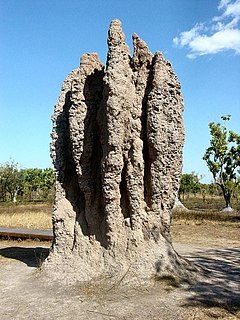Zoology is the branch of biology that studies the animal kingdom, including the structure, embryology, evolution, classification, habits, and distribution of all animals, both living and extinct, and how they interact with their ecosystems. The term is derived from Ancient Greek ζῷον, zōion ('animal'), and λόγος, logos.
Theories of political behavior, as an aspect of political science, attempt to quantify and explain the influences that define a person's political views, ideology, and levels of political participation. Political behavior is the subset of human behavior that involves politics and power. Theorists who have had an influence on this field include Karl Deutsch and Theodor Adorno.

A superorganism or supraorganism is a group of synergetically interacting organisms of the same species. A community of synergetically interacting organisms of different species is called a holobiont.

Evolutionary biology is the subfield of biology that studies the evolutionary processes that produced the diversity of life on Earth. Simply, it is also defined as the study of the history of life forms on Earth. Evolution is based on the theory that all species are related and they gradually change over time. In a population, the genetic variations affect the physical characteristics i.e. phenotypes of an organism. These changes in the phenotypes will be an advantage to some organisms, which will then be passed onto their offspring. Peppered Moth and Flightless birds are some examples of evolution in species over many generations. In the 1930s, the discipline of evolutionary biology emerged through what Julian Huxley called the modern synthesis of understanding, from previously unrelated fields of biological research, such as genetics and ecology, systematics, and paleontology. A person who studies Evolutionary biology is called an Evolutionary biologist. The importance of studying Evolutionary biology is mainly to understand the principles behind the origin and extinction of species.
Moral psychology is a field of study in both philosophy and psychology. Historically, the term "moral psychology" was used relatively narrowly to refer to the study of moral development. Moral psychology eventually came to refer more broadly to various topics at the intersection of ethics, psychology, and philosophy of mind. Some of the main topics of the field are moral judgment, moral reasoning, moral sensitivity, moral responsibility, moral motivation, moral identity, moral action, moral development, moral diversity, moral character, altruism, psychological egoism, moral luck, moral forecasting, moral emotion, affective forecasting, and moral disagreement.

Sociobiology: The New Synthesis is a book by the biologist E. O. Wilson. It helped start the sociobiology debate, one of the great scientific controversies in biology of the 20th century and part of the wider debate about evolutionary psychology and the modern synthesis of evolutionary biology. Wilson popularized the term "sociobiology" as an attempt to explain the evolutionary mechanics behind social behaviour such as altruism, aggression, and the nurturing of the young. It formed a position within the long-running nature versus nurture debate. The fundamental principle guiding sociobiology is that an organism's evolutionary success is measured by the extent to which its genes are represented in the next generation.
Biopower is a term coined by French scholar, philosopher, historian, and social theorist Michel Foucault. It relates to the practice of modern nation states and their regulation of their subjects through "an explosion of numerous and diverse techniques for achieving the subjugations of bodies and the control of populations". Foucault first used the term in his lecture courses at the Collège de France, and the term first appeared in print in The Will to Knowledge, Foucault's first volume of The History of Sexuality. In Foucault's work, it has been used to refer to practices of public health, regulation of heredity, and risk regulation, among many other regulatory mechanisms often linked less directly with literal physical health. It is closely related to a term he uses much less frequently, but which subsequent thinkers have taken up independently, biopolitics, which aligns more closely with the examination of the strategies and mechanisms through which human life processes are managed under regimes of authority over knowledge, power, and the processes of subjectivation.
Biopolitics is an intersectional field between human biology and politics. Biopolitics takes the administration of life and a locality’s populations as its subject. To quote Michel Foucault, it is "to ensure, sustain, and multiply life, to put this life in order."
The philosophy of biology is a subfield of philosophy of science, which deals with epistemological, metaphysical, and ethical issues in the biological and biomedical sciences. Although philosophers of science and philosophers generally have long been interested in biology, philosophy of biology only emerged as an independent field of philosophy in the 1960s and 1970s. Philosophers of science then began paying increasing attention to biology, from the rise of Neodarwinism in the 1930s and 1940s to the discovery of the structure of DNA in 1953 to more recent advances in genetic engineering. Other key ideas include the reduction of all life processes to biochemical reactions, and the incorporation of psychology into a broader neuroscience.

Evolutionary ethics is a field of inquiry that explores how evolutionary theory might bear on our understanding of ethics or morality. The range of issues investigated by evolutionary ethics is quite broad. Supporters of evolutionary ethics have claimed that it has important implications in the fields of descriptive ethics, normative ethics, and metaethics.

A biologist is a scientist who conducts research in biology. Biologists are interested in studying life on Earth, whether it is an individual cell, a multicellular organism, or a community of interacting populations. They usually specialize in a particular branch of biology and have a specific research focus.
Cultural selection theory is the study of cultural change modelled on theories of evolutionary biology. Cultural selection theory has so far never been a separate discipline. However it has been proposed that human culture exhibits key Darwinian evolutionary properties, and "the structure of a science of cultural evolution should share fundamental features with the structure of the science of biological evolution". In addition to Darwin's work the term historically covers a diverse range of theories from both the sciences and the humanities including those of Lamark, politics and economics e.g. Bagehot, anthropology e.g. Edward B. Tylor, literature e.g. Ferdinand Brunetière, evolutionary ethics e.g. Leslie Stephen, sociology e.g. Albert Keller, anthropology e.g. Bronislaw Malinowski, Biosciences e.g. Alex Mesoudi, geography e.g. Richard Ormrod, sociobiology and biodiversity e.g. E.O. Wilson, computer programming e.g. Richard Brodie, and other fields e.g. Neoevolutionism, and Evolutionary archaeology.

Evolutionary educational psychology is the study of the relation between inherent folk knowledge and abilities and accompanying inferential and attributional biases as these influence academic learning in evolutionarily novel cultural contexts, such as schools and the industrial workplace. The fundamental premises and principles of this discipline are presented below.

Jonathan David Haidt is an American social psychologist, Professor of Ethical Leadership at New York University Stern School of Business, and author. His main areas of study are the psychology of morality and moral emotions.
Peter Andrew Corning is an American biologist, consultant, and complex systems scientist, and Director of the Institute for the Study of Complex Systems, in Seattle, Washington, and is known especially for his work on the causal role of synergy in evolution.
Genopolitics is the study of the genetic basis of political behavior and attitudes. It combines behavior genetics, psychology, and political science and it is closely related to the emerging fields of neuropolitics and political physiology.
A number of studies have found that human biology can be linked with political orientation. This means that an individual's biology may predispose them to a particular political orientation and ideology. Many of the studies linking biology to politics remain controversial and unrepeated, although the overall body of evidence is growing.
Neuropolitics is a science which investigates the interplay between the brain and politics. It combines work from a variety of scientific fields which includes neuroscience, political science, psychology, behavioral genetics, primatology, and ethology. Often, neuropolitics research borrow methods from cognitive neuroscience to investigate classic questions from political science such as how people make political decisions, form political / ideological attitudes, evaluate political candidates, and interact in political coalitions. However, another line of research considers the role that evolving political competition has had on the development of the brain in humans and other species. The research in neuropolitics often intersects with work in genopolitics, political psychology, political physiology, sociobiology, neuroeconomics, and neurolaw.
Moral foundations theory is a social psychological theory intended to explain the origins of and variation in human moral reasoning on the basis of innate, modular foundations. It was first proposed by the psychologists Jonathan Haidt, Craig Joseph and Jesse Graham, building on the work of cultural anthropologist Richard Shweder; and subsequently developed by a diverse group of collaborators, and popularized in Haidt's book The Righteous Mind. The theory proposes six foundations: Care/Harm, Fairness/Cheating, Loyalty/Betrayal, Authority/Subversion, Sanctity/Degradation, and Liberty/Oppression; while its authors remain open to the addition, subtraction or modification of the set of foundations.
Cultural evolution is an evolutionary theory of social change. It follows from the definition of culture as "information capable of affecting individuals' behavior that they acquire from other members of their species through teaching, imitation and other forms of social transmission". Cultural evolution is the change of this information over time.





